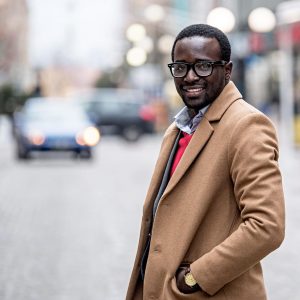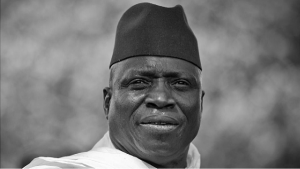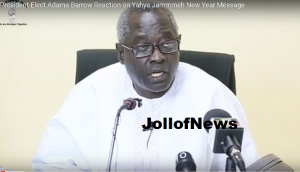
(JollofNews) – In an article (Vision 2020 vs. Jammehism and Jammehnomics) published in 2012, I coined the term ‘Jammehism’ and ‘Jammehnomics’ to refer to the exile former president’s philosophy of politics and economics.
My respected colleague, Saikou Jammeh, the editor-in-chief of the Daily News (www.dailynews.gm) at the time, took the risk to publish this article; and few months later, Daily News was ordered to stop printing. The article might not be the sole cause, but articles of that nature never registered well with Jammehism. With Jammeh gone, we have entered a new epoch: Sallahism. This epoch has two underlying mission: ushering in Halifa Sallah’s ideas and vision of a state, and abolishing Jammeh’s economics and political philosophy – de-Jammehnisation. This begs the question: What is Sallahism?
Born in Serrekunda and educated in the US, Halifa Sallah returned home in the 1970s during the turbulent days of pan-Africanism and the Cold War, totally appalled at capitalism, neo-colonialism and the racism he saw in the US. Part of the founding fathers of the ‘Red Star’, commonly known as the People’s Movement for Independence against Neo-Colonialism and Capitalism (PMINCC), Sallah began to espouse social democracy, believing that for a nation to realize its political and social freedoms, the masses have to, first, be free from external and internal oppressions and domination, and second, be educated to become masters of state and society.
“When the state becomes independent, the next step is to give freedom to the people,” he would later tell a Senegalese journalist. For thirty years, Halifa was popular with the educated few, but failed massively to win the support of the masses, because they never understood his politics.
Over the years, Sallah has wrestled to fathom the meanings and significances of being independent, and he has ferreted out every constitutional document to defend people’s freedoms and rights. As the vanguard of Gambia’s young democracy, Sallah’s dynamic thoughts and political acuities have made him a radical pragmatist. But the important question to ask is: Can Halifa Sallah deliver us to his vision of a state, especially when political theorists have argued that it is difficult to democratize a poor country which was once a bastion of despotism? The answer depends largely on the democratization culture that Gambians will nurture – it reminds us: Yahya was not a dictator, Gambians made him one.

First, the country has to be de-Jammehnised. That process has started with the upgrading of the notorious intelligence agency (NIA), and has to continue during the upcoming National Assembly election. Dynamic and educated citizens have to occupy the National Assembly, so that laws would be enacted to make it possible for the rise of many Halifa Sallahs, but also to stop the rise of another Yahya Jammeh. After decades of bureaucratic degeneration, institutions have become deformed caricatures of republicanism; and the country is still politically and socially divided between titillating supporters of democracy and reactionary forces emanating from Jammeh’s bad legacy. At this, to demand a quick-fix answer to the national problems the country faces, offers us the metaphor of a madman’s dream – untenable.
Democratization is a process, and from the breakdown of an old system to the consolidation of the new one can take time. This can entail four stages; and The Gambia has just entered the second stage – the emerging stage, where the old undemocratic ways of governance (Jammehism) are being demolished, and the new ones (Sallahism) are in the making. The two remaining stages, the advanced phase and the consolidation phase, are going to be the litmus taste for the new government.
After Jammehism has gone and Sallahism has become a political hallmark, Gambians will undoubtedly take liberty for granted and there will be increased stress on economic, social and political equality. When the country graduates to these two stages, the government will have to get used to the democratic steaming machine – the popular pressure that democratic politics unleashes – and avoid what political scientists would call ‘disequilibrium’, which, in itself, is a cataclysm to social unrests.
In order to see a smooth transition to democracy, Gambians have to desist from political and tribal fundamentalism. APRC and GDC supporters should not be seen as nemeses to democratic urges of the people; they should all be equally treated, just like any other Gambian, because that is what democracy entails: messy, appalling, beautiful, and worthwhile. However, given the pedestal to exercise their political rights, they have to be on their best behaviour: the rule of law and national security takes precedence over political rights (I am sure Interior Minister Fatty must have told them this).

Now, the inclusion of Jolas in the Barrow administration – though admonished by many – is a right decision and part of creating a representative government. After all Jolas were not the problem, but Yahya Jammeh was. There were many Jolas during Jammeh’s era who chose to disassociate themselves from his regime. So it takes political chutzpah and moral bankruptcy to blame them for the leadership failure – something contrary to Sallahism.
Whereas Yahya was a tribal-fanatic who had the personality of a boiled potato, Halifa Sallah is a combination of political legerdemain and firm leadership, a compelling portrait of intellectual maverick who presents a striking contrast to the ageing and intellectually stultified leaders of the new administration.
However, Sallah should not be made infallible and unquestionable, because, after all, to question one another is what Gambians have fought for. Whenever proponents of Sallahism become angry with other people who question Halifa, then we may as well borrow Aristotle’s reaction to Plato on his take on Athenian democracy: “Who will guard the guardian?”
By Amat Jeng
Amat Jeng is a Gambian and naturalized Swedish citizen who studies International Relations (Studies) and English at the Dalarna University, Sweden, and now studies at Oxford as an Erasmus fellow. Email: h15amaje@du.se / 16105628@brookes.ac.uk





